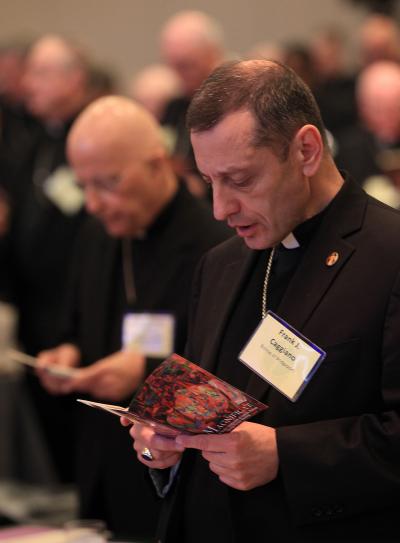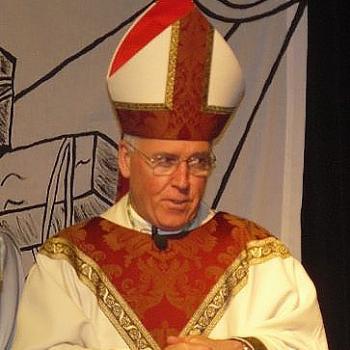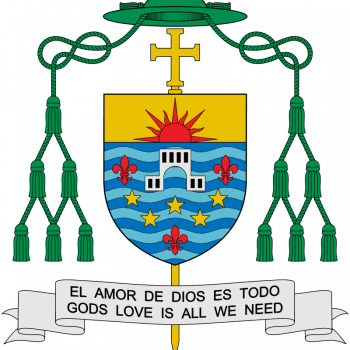Bishop Frank Caggiano of Bridgeport is convoking a local synod in his diocese. Sean Salai, S.J. at America magazine interviewed him about what this synod might entail.
Reports from the pre-synod listening sessions you held in the spring indicated a wide variety of perspectives, with some people wanting a stronger devotional life and others voicing more progressive concerns. As a bishop, how do you balance people’s pastoral needs in a way that makes everyone feel cared for?
This is at the heart of what a synod is and I think it’s going to be very hard for most people, and at times even myself, to understand that a synod is more a process of discernment than it is of deliberation. And that is where, as Americans, we might be a bit behind the eight ball, because we tend to understand gatherings of individuals assembled to address problems as a deliberative action. That is, we identify what the problem is and we make a decision to address it. That is not what a synod is, though. A synod is a discerning process in which, once the issue has been clarified, we need to sit and listen to the voices who can inform us of what the program or solution needs to be. And I think that’s part of that formational process. We need to suspend our initial reaction that “we’re going to solve this problem by doing X” and take a step back and deliberate—to allow a discernment to occur, to allow the Holy Spirit to enlighten us about what God is asking us to do. Because it’s not our church, it’s his church first and foremost.
So that’s where I think the challenge is. Now the second piece of the question is “to whom do we listen?” That is where the rubber hits the road. There’s a bias in contemporary society that the only voices we hear are the ones who speak to us here and now. You know, I call it the “blog phenomenon.” But in fact, the voices we listen to are the voices of the tradition, starting with the apostles and working our way up to you and me. And that’s where the discernment comes in. And that’s why the synodal process is personally enriching, but it’s also a heck of a lot of work to get all the voices in the mix. It’s the magisterium, it’s sacred scripture, it’s the tradition and all the great teachers from the Fathers of the Church onward who are able to inform us of what the Holy Spirit might be asking us to do. Because the bottom line is this: There is precious little that is new under the sun. We as contemporaries think all of our problems are new, and that we have to come up with new ideas, and new programs, and that’s baloney. There is very little that’s new after 2,000 years that the church has not struggled with in other ages. So why reinvent the wheel? Why not go back to those times and have those voices inform us? I’m not sure, but for the synodal delegates, I think that will be the hardest piece of this process.
As you’ve mentioned, one of the themes for your synod is building bridges to those who have left the church. Do you have any initial thoughts on how to move forward with that issue?
Yeah, I have just one, and it’s a foundational principle that has come to the fore in my own reflection and prayer over the last six or seven years—and it is a radical change from what I used to think. I say “radical” because it really reworks a lot of what I used to consider the hallmarks of success. It’s this: Up to recently, the church has usually turned to creating a pastoral program when facing a pastoral challenge, to address that challenge. Now, that will always have a place in the life of the church. But I think the genius of Pope Francis is that he has expressed in words what I was intuiting, when he speaks about missionary discipleship, that we need to reach out one person at a time. That has phenomenal implications for the life of the church. If the methodology is “one person at a time,” then each and every baptized person is called to get involved. That’s the only way we’re going to do it. It also implies that we’re going to have to invest time to sit and listen to the people who we wish to invite back, to allow them to tell us their story, for healing whatever needs to be healed. And it implies that success has to be measured by sowing seeds, even when you don’t see the seed grow initially, because the person who comes after you sees the seed blossom. It demands a spirituality, it demands a discipline in prayer and it demands a pastoral faith reflection which will for many people be a brand new experience. That’s my initial insight going into the synod. It could be leaven for tremendous renewal of people’s lives because there are no more spectators at the synod.












